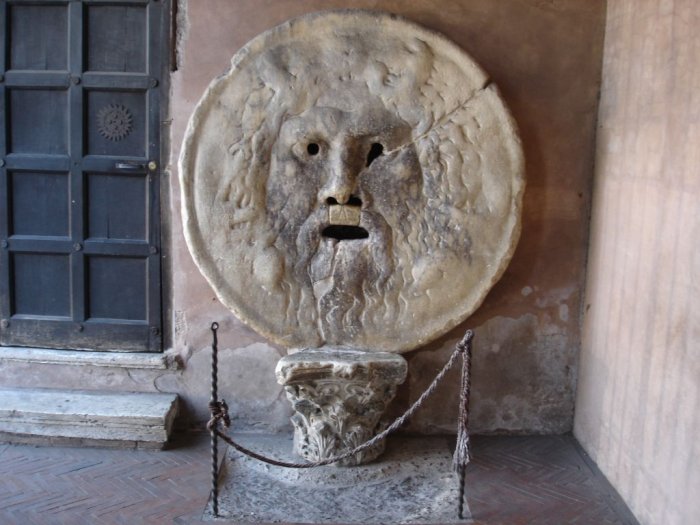Bizarre Ancient Lie Detector – The Mouth Of Truth – Bocca della Verità
A. Sutherland - AncientPages.com - Bocca della Verità is an ancient stone mask that once served as a tool to determine if a person was lying or telling the truth. The name means "the Mouth of Truth" in English, and the superstition that the stone face can judge a person's honesty is still alive among some people.
 Detail of the Oceanus mosaic, a depiction of the sea-god Oceanus, 3rd century AD, Römerhalle, Bad Kreuznach, Germany.
Detail of the Oceanus mosaic, a depiction of the sea-god Oceanus, 3rd century AD, Römerhalle, Bad Kreuznach, Germany.
Located just outside the doors of the Paleochristian church of Santa Maria in Cosmedin, at the foot of the Aventine Hills, Italy, the ancient carving has become famous over the years.
Its fame is primarily due to the macabre legend associated with the mask. According to ancient beliefs, "the Mouth of Truth" bites the hands of liars.
Unknown Origin Of The "Mouth Of Truth"
The massive marble mask weighs about 1300 kg and has a diameter of 1.75 meters. It probably depicts the face of the sea god, Oceanus. The eyes, nostrils, and mouth are open.
Historians are uncertain of the original purpose of the disc.
The ancient stone mask served as an ancient lie detector. Image credit: visitlazio.com
It was possibly used as a drain cover in the nearby Temple of Hercules Invictus. It had an oculus - a round open space in the middle of the roof. During the Roman age, this mysterious mask was just a sewer cover. For this reason, many historians have associated it to the water (river) divinities, drinking the rain, letting the water flow to the sea.
The Legend Of The "Mouth of Truth"
Starting from the Middle Ages, it was believed that if one told a lie with one's hand in the mouth of the sculpture, it would be bitten off. There was also a medieval legend about a wealthy wife of a Roman noble who was accused of adultery.
The woman denied the accusations. However, her husband wanted to test her by putting her hand inside the stone mouth. Knowing perfectly well that she was lying, the woman used a very clever strategy. In front of a group of curious witnesses who had gathered around the Mouth of Truth, the man who was her lover embraced her and kissed her.
 The Mouth of Truth is known to English-speaking audiences mostly from its appearance in the 1953 film Roman Holiday. The film also uses the Mouth of Truth as a storytelling device since both Hepburn's and Peck's characters are not initially truthful with each other.
The Mouth of Truth is known to English-speaking audiences mostly from its appearance in the 1953 film Roman Holiday. The film also uses the Mouth of Truth as a storytelling device since both Hepburn's and Peck's characters are not initially truthful with each other.
She pretended she didn't know him, accused him of being a madman, and the crowd chased him away. When she put her hand into the mouth, the woman declared that she had never kissed any other man apart from her husband and the poor madman who had just kissed her. In this way, she was confident that she hadn't lied and her hand was saved.
The betrayed husband saved her honor, but the Mouth of Truth lost its credibility, and it is said that since that day, it no longer carried out its function as a right and unappeasable judge.
This is just one of the many legends that mention this famous sculpture. In other stories, the mouth of the mask was the top of the holy spring situated in front of Mercury temple, where the Roman merchants used to swear their honesty during their trades.
Ancient Stone Mask Remains Popular In Modern Days
This ancient mask has never lost its popularity. Even today, it is the cause of queues of tourists who line up outside the beautiful Paleochristian church of Santa Maria in Cosmedin. Many are eager to put their hands in this mouth, but some hesitate at the last minute.
Curiously, there is a similar sculpture of a lion in Mahabalipuram, Tamil Nadu, India, that, according to local lore, bites off one's hand if a lie is told.
It seems that these quite bizarre lie detectors were popular in ancient times.
Written by – A. Sutherland - AncientPages.com Senior Staff Writer
Updated on November 26, 2022
Copyright © AncientPages.com All rights reserved. This material may not be published, broadcast, rewritten or redistributed in whole or part without the express written permission of AncientPages.com
More From Ancient Pages
-
 Archaeologists Uncover Secrets Of ‘Vallø Borgring’ Viking Age Circular Fortress
Archaeology | Oct 11, 2015
Archaeologists Uncover Secrets Of ‘Vallø Borgring’ Viking Age Circular Fortress
Archaeology | Oct 11, 2015 -
 Ancient Murals Of Mysterious Two-Faced Beings And Supernatural Creatures At Pañamarca, Peru
Archaeology | Mar 21, 2023
Ancient Murals Of Mysterious Two-Faced Beings And Supernatural Creatures At Pañamarca, Peru
Archaeology | Mar 21, 2023 -
 Ishtar Gate, The Eighth Gate Of The Inner City Of Babylon
Civilizations | Sep 6, 2015
Ishtar Gate, The Eighth Gate Of The Inner City Of Babylon
Civilizations | Sep 6, 2015 -
 1,000-Year-Old Church Walls Unearthed In Ethiopia By Polish Archaeologists
Archaeology | Apr 26, 2020
1,000-Year-Old Church Walls Unearthed In Ethiopia By Polish Archaeologists
Archaeology | Apr 26, 2020 -
 Incredible 2,300-Year-Old Roman-Etruscan Time Capsule Opened In San Casciano dei Bagni, Italy
Featured Stories | Dec 20, 2023
Incredible 2,300-Year-Old Roman-Etruscan Time Capsule Opened In San Casciano dei Bagni, Italy
Featured Stories | Dec 20, 2023 -
 The Perplexing Story Of The Seven Continents And The Seven Mysterious Races – Distant Past – Part 1
Featured Stories | May 9, 2022
The Perplexing Story Of The Seven Continents And The Seven Mysterious Races – Distant Past – Part 1
Featured Stories | May 9, 2022 -
 3,000-year-old knight discovered at the Palidli necropolis
Civilizations | Aug 22, 2015
3,000-year-old knight discovered at the Palidli necropolis
Civilizations | Aug 22, 2015 -
 Wadjet – Egyptian Goddess Protected Pharaohs And Was Depicted As A Cobra-Uraeus
Egyptian Mythology | May 29, 2021
Wadjet – Egyptian Goddess Protected Pharaohs And Was Depicted As A Cobra-Uraeus
Egyptian Mythology | May 29, 2021 -
 Amazing Ancient Chumash Cave Paintings In California Offer Insight Into Ancient Shamanism And Supernatural Beliefs
Civilizations | Nov 5, 2018
Amazing Ancient Chumash Cave Paintings In California Offer Insight Into Ancient Shamanism And Supernatural Beliefs
Civilizations | Nov 5, 2018 -
 Traces Of An Ancient Near East Civilization In America – Lost Tribes And Unorthodox Discoveries – Part 1
Civilizations | Nov 8, 2020
Traces Of An Ancient Near East Civilization In America – Lost Tribes And Unorthodox Discoveries – Part 1
Civilizations | Nov 8, 2020 -
 Was The Tree Of Knowledge Perhaps The Hall Of Records? – A Mysterious Ancient Library Containing Forbidden Knowledge
Biblical Mysteries | Mar 29, 2017
Was The Tree Of Knowledge Perhaps The Hall Of Records? – A Mysterious Ancient Library Containing Forbidden Knowledge
Biblical Mysteries | Mar 29, 2017 -
 3,000-Year-Old Fortress Built By The Mysterious Votadini Tribe Discovered On Top Of Arthur’s Seat
Archaeology | Sep 11, 2020
3,000-Year-Old Fortress Built By The Mysterious Votadini Tribe Discovered On Top Of Arthur’s Seat
Archaeology | Sep 11, 2020 -
 Lost Ancient Dragon City Of The Xiongnu Empire Discovered In Mongolia
Archaeology | Jul 22, 2020
Lost Ancient Dragon City Of The Xiongnu Empire Discovered In Mongolia
Archaeology | Jul 22, 2020 -
 Massive 2nd-Century Fountain In Turkey’s Ancient City Of Tripolis Will Be Soon Restored
Archaeology | Aug 3, 2020
Massive 2nd-Century Fountain In Turkey’s Ancient City Of Tripolis Will Be Soon Restored
Archaeology | Aug 3, 2020 -
 Mystery Of The Second Gabriel Stone And The Man Resurrected By Archangel Gabriel
Biblical Mysteries | Sep 10, 2018
Mystery Of The Second Gabriel Stone And The Man Resurrected By Archangel Gabriel
Biblical Mysteries | Sep 10, 2018 -
 Roman Consuls Seized Power Through Intimidation, Bribery And Show Business
Ancient History Facts | Feb 24, 2021
Roman Consuls Seized Power Through Intimidation, Bribery And Show Business
Ancient History Facts | Feb 24, 2021 -
 Salzburg Catacombs: Early Christian Place For Secret Gatherings And Hiding From Persecution
Featured Stories | Mar 16, 2016
Salzburg Catacombs: Early Christian Place For Secret Gatherings And Hiding From Persecution
Featured Stories | Mar 16, 2016 -
 Controversial Ancient Tomb Could Prove The Existence Of Biblical Jonah
Archaeology | Mar 9, 2014
Controversial Ancient Tomb Could Prove The Existence Of Biblical Jonah
Archaeology | Mar 9, 2014 -
 New Study: Fossils Reveal Human Ancestors’ Hearing Abilities
Human Beginnings | Sep 28, 2015
New Study: Fossils Reveal Human Ancestors’ Hearing Abilities
Human Beginnings | Sep 28, 2015 -
 Arch Of Triumph In 2000-Year-Old City Of Palmyra – Destroyed
Archaeology | Oct 5, 2015
Arch Of Triumph In 2000-Year-Old City Of Palmyra – Destroyed
Archaeology | Oct 5, 2015

